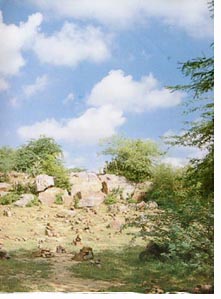Govardhan Hill
Glories of Govardhana Hill
Appearance of Govardhana Hill
Krishna's Lifting of Govardhana Hill
Govardhana Parikrama Kusama
Sarovara Manasi Ganga
Sanatana Goswami Bhajana Kutira
Aniyora Village Govinda
Kunda Parikrama Map
The
Glories of Govardhana Hill
O
Govardhana, O king of mountains,
O
hill whose nectarian name—the best of Hari’s servants—
flows
from the moonlike mouth of Sri Radha,
O
hill that the Vedas declare to be the tilaka marking of Vraja, please grant me a
residence near to you.
Stavavali
- Ragunatha dasa Gosvami
 Govardhana
Hill is acknowledged throughout the Vedic scripture’s as the most sacred
mountain not only in the whole of India, but in all the three worlds. It is
therefore no wonder that when Govardhana Hill appeared, all the great mountains
of the universe came and worshipped him as their king. They also declared that
Govardhana had descended from Goloka Vrindavana in the spiritual world and is the
crown jewel of Vraja.
Govardhana
Hill is acknowledged throughout the Vedic scripture’s as the most sacred
mountain not only in the whole of India, but in all the three worlds. It is
therefore no wonder that when Govardhana Hill appeared, all the great mountains
of the universe came and worshipped him as their king. They also declared that
Govardhana had descended from Goloka Vrindavana in the spiritual world and is the
crown jewel of Vraja.
The Vedas also inform us that Govardhana Hill is understood in two
different ways. First, as the greatest devotee of Lord Krishna, and second as
being non-different from Lord Krishna Himself.
To the beautiful gopis of Vrndavana Srimati Radharani praised Govardhana Hill as the
very best servant (Haridasa-varya) of Lord Krishna in the following words:
Of all the devotees, this
Govardhana Hill is the best! O my friends, this hill supplies Krishna and Balarama,
along with their calves, cows and cowherd friends, with all kinds of necessities –
water for drinking, very soft grass, caves, fruits, flowers and vegetables. In
this way the hill offers respects to the Lord. Being touched by the lotus feet
of Krishna and Balarama, Govardhana Hill appears very jubilant.
Srimad-Bhagavatam 10.21.18
 As the best servant, Govardhana Hill provides
Krishna and Balarama and the
inhabitants of Vrindavana with all the necessities of life: cool fragrant
drinking water from its many waterfalls, pure honey, mango juice and peelu
juice, wonderful varieties of, herbs, roots, fruits, creepers and fresh flowers.
Govardhana also provides various minerals and precious gems that the cowherd
boys use to decorate Krishna and Balarama and themselves as well.
As the best servant, Govardhana Hill provides
Krishna and Balarama and the
inhabitants of Vrindavana with all the necessities of life: cool fragrant
drinking water from its many waterfalls, pure honey, mango juice and peelu
juice, wonderful varieties of, herbs, roots, fruits, creepers and fresh flowers.
Govardhana also provides various minerals and precious gems that the cowherd
boys use to decorate Krishna and Balarama and themselves as well.
This sacred hill also provides deep caves where
Krishna and Balarama rest
and take shelter against the rain and the scorching Sun. Krishna also enjoys many
intimate loving pastimes with Srimati Radharani in these caves.
Govardhana Hill also provides a special kind of soft, fragrant grass that
makes the cows strong and healthy. This grass also helps increase the cow’s
milk production, which is used to make pure ghee for the sacrificial fire and
cooking. The milk is also turned into butter, yogurt, cheese and an amazing
variety of milksweets.
 Considering that milk is the economic backbone of the inhabitants of
Vrndavana, it is no wonder that Lord Krishna advised the Vrajavasis to stop the
sacrifice to Lord Indra and worship Govardhana Hill instead.
Considering that milk is the economic backbone of the inhabitants of
Vrndavana, it is no wonder that Lord Krishna advised the Vrajavasis to stop the
sacrifice to Lord Indra and worship Govardhana Hill instead.
Govardhana Hill also provides Lord
Krishna with a stage to perform His
innumerable transcendental loving pastimes with the beautiful damsels of Vraja
and with His cowherd boyfriends.
The Vedas also say that Govardhana Hill is non-different from the Supreme
Personality of Godhead, Lord Krishna Himself. When Sri Chaitanya Mahaprabhu visited
Vraja in the year 1515, He refused to climb Govardhana Hill because He saw that
Govardhana was non-different from Lord Krishna. At the time of the annakuta ceremony, Krishna declared that He was non-different from
Govardhana Hill:
Krishna
then assumed an unprecedented huge form to instil faith in the cowherd men
declaring, ‘I am Govardhana Mountain!’ He ate the abundant offerings.
Together with the people of Vraja, the Lord bowed down to Govardhana Hill, thus
in effect offering obeisances to Himself. Then He said, “ Just see how this
hill has appeared in person and bestowed mercy upon us!
Srimad-Bhagavatam
10.24.35-6
Because Govardhana Hill is non-different from
Krishna Himself, the rocks
from Govardhana are worshipable just like a Deity of Krishna. In fact, the stones
known as Govardhana-silas do not need
to be installed as they are already considered to be worshipable Deities. Many
great devotees have worshiped these silas
from Govardhana: Sanatana Gosvami, Raghunatha dasa Gosvami and Lord Chaitanya Mahaprabhu Himself.
Govardhana
Hill should be envisioned to be in the shape of a peacock resting with its head
tucked into its side. Its face is considered to be Kusuma-sarovara, its neck
Manasa-ganga, its mouth Mukharavinda, its two eyes Radha-kunda and Syama-kunda,
the beginning of its tail Balarama Sthali and the end Punchari-kunda (Naval-kunda).
top of page